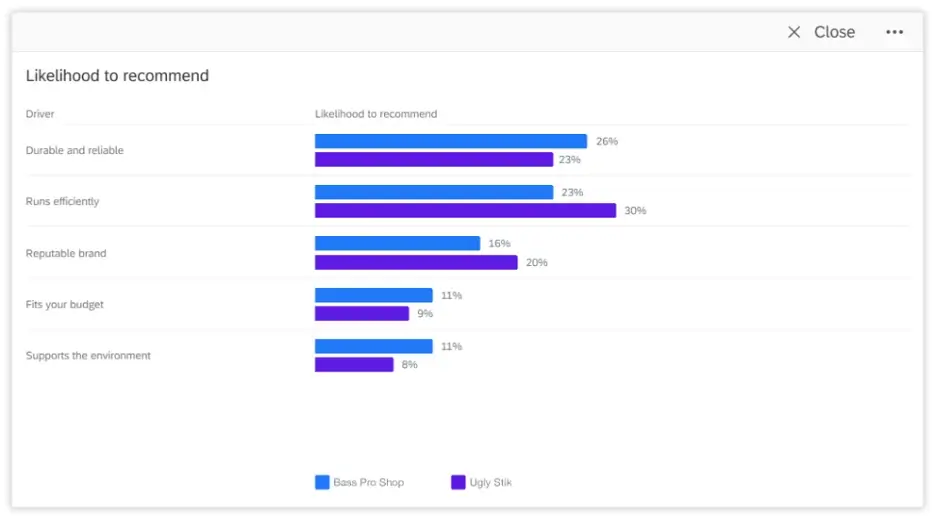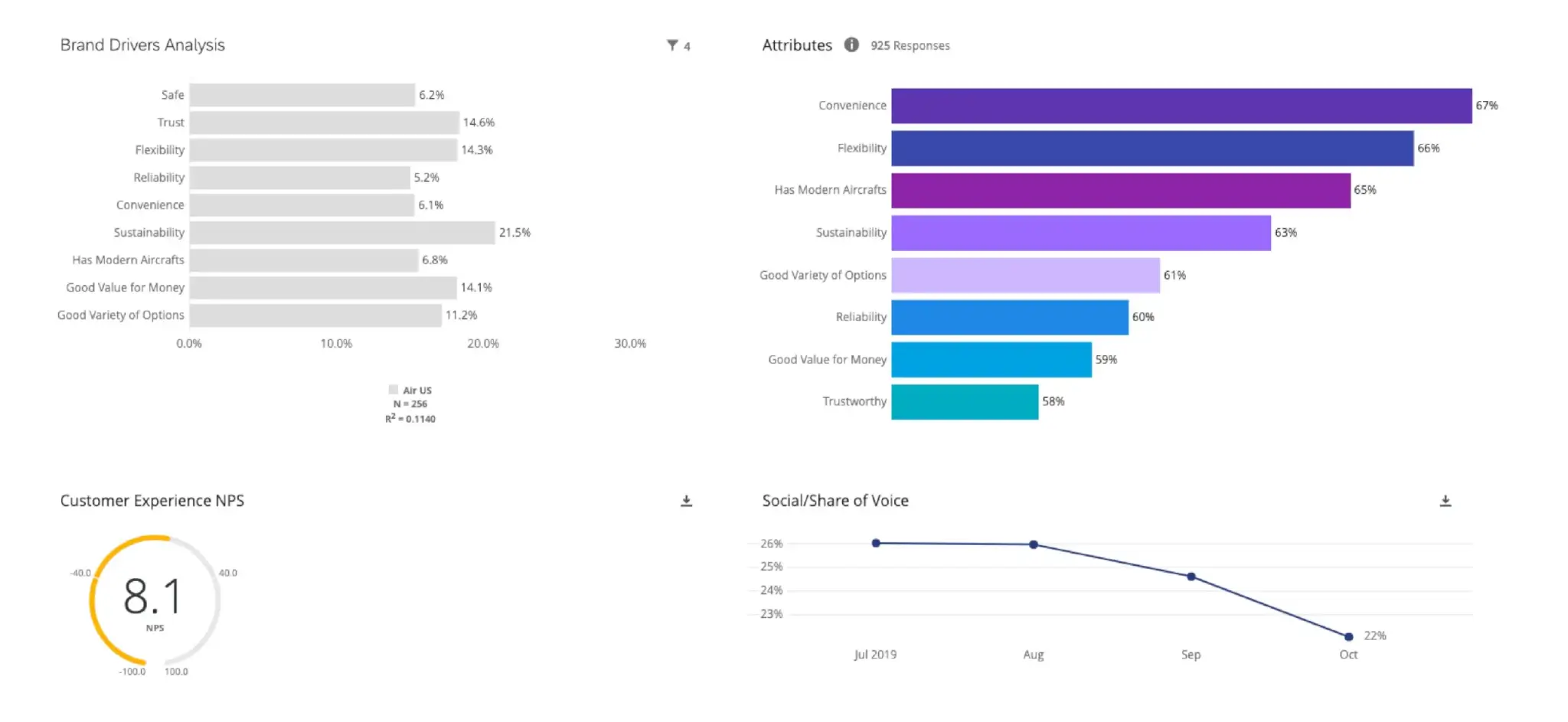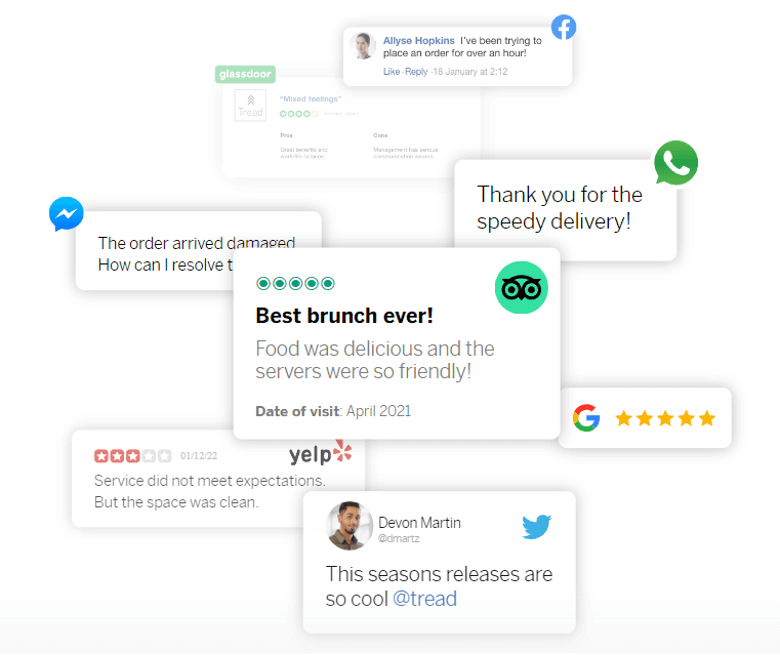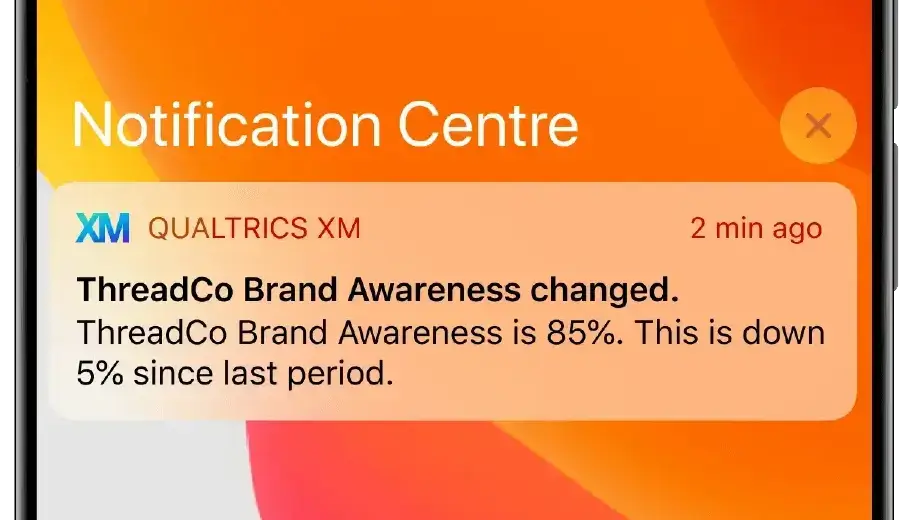What is brand intelligence?
Brand intelligence is the term used to describe data collection around all the signals and signs that reveal the consumer perception of a specific brand.
Brand intelligence is a process that’s made possible via brand tracking software, which can bring everything from survey feedback to social share of voice information into one place and unify the data – turning all those informational points into insights and actions. Those actions, fuelled by real data rather than hunches, are how brands can make a positive change in how they’re perceived publicly.
![]()
Because of that, brand intelligence helps businesses both understand and improve a bunch of core tenets and metrics that make up a brand’s overall presence and reputation, including:
- Brand awareness
- Brand recognition
- Share of search
- Brand recall
- Brand perception
- Share of voice
- NPS & CSAT (customer satisfaction)
- Brand attributes and characteristics
- Online customer reviews and opinions
What’s important is that brand intelligence software doesn’t just gather and present metrics; great brand tracking software can also suggest actions that help move the needle on all the metrics listed above, which drives customer satisfaction and reputational growth, and helps brands attain a competitive advantage.
Brand Experience eBook: Brand Tracker Toolkit
Why is brand intelligence important?
Brand intelligence is all about discovery and action. With the right brand intelligence software solutions in place, you’ll be able to discover what’s working with your branding efforts and take action on areas that need improvement.
So why is doing that important? Well, increasingly, brand power is key to securing customer loyalty and increasing customer lifetime value. That’s because, in many markets, brands are actually more important than products. In fact, 77% of consumers make their purchasing decisions based on the former, rather than the latter.
That favoritism is the result of an emotional connection which, once formed, is an incredibly powerful asset to any company. A huge 94% of consumers recommend brands they feel emotionally connected with.

Brand intelligence platforms are how you’ll achieve that bond. These tools are vital for shaping your brand online, in ways that go beyond just colors and visual consistency. With the right tools, you can also work on building the core characteristics of your brand identity, which are the facets of your business today’s customers really resonate with.
For example, 86% of consumers want authenticity from the brands they buy from, 94% want transparency, and 65% want to buy from genuine brands.
Because of that, it’s important to arm your brand with the tools it needs to be able to compete; you need to know exactly what your public perception is across all of those characteristics and metrics if you want to be able to improve them.
Generally speaking, improving all of the above will result in a more unified, consistent brand, which – according to Lucidpress – can increase revenue by up to 20%.
What can brand intelligence software do for you?
Branding is an umbrella term for a multi-faceted practice. When you’re brand building, you’re looking to build a competitive advantage by unifying, codifying, and consistently promoting your business as a memorable, positive entity.
Imagine that incredible brand value as a house you want to build; the work you put in would be the bricks and raw materials, but brand intelligence software is the blueprint and the tools.
Let’s look at each of the various core components of great branding we mentioned earlier to see how brand intelligence platforms can help deliver actionable insights and improvement:
Brand awareness
Brand awareness is a massive driver for product sales – people trust brands they already know about, so building your profile is key to success. With the help of surveys and share of voice tracking, brand intelligence software can tell you how many people know about your brand, and what you can do to bolster that with your marketing efforts.
Brand recognition and recall
Knowing about your brand is one thing, but can people remember it, totally unprompted? And can they tell your logo apart from others? Brand intelligence software can dig into the numbers to help you learn how better to unify your visual identity.
Brand perception
It’s not enough to have great products. Today’s customers want their brands to be trustworthy and known for their positive qualities. If you can understand how people feel about you, you’ll know what needs to be done to create more affirmative connotations.

Share of voice
Share of voice on social media platforms plays a huge role in creating brand awareness and recognition. Software that can understand your presence on social media channels in relation to your competitors can help inform the direction of content marketing campaigns so that they’re more impactful at building awareness over time.
NPS & CSAT (customer satisfaction)
CSAT and NPS are industry-standard metrics denoting the likelihood to recommend as well as overall satisfaction, but where brand intelligence software goes above and beyond is in its ability to understand exactly what’s driving those recommendations – and how they stack up against your rivals. You might have the edge in terms of value, for example, but a lower recommendation likelihood in conversations around reliability.
Brand attributes and characteristics
Are you known for your environmentalism? Your openness? Your great build quality, or your low prices? Brand intelligence is more than just numbers; it’s about learning what kind of characteristics people think your brand has, and then working to further cement the ones you want, while moving away from the ones you don’t.
Online customer reviews and opinions
Online reviews are a powerful indicator of brand health, so you’ll want brand intelligence tools that can scour the web and wrap valuable extra information into the overall context of brand performance. It’s these opinions, good and bad, that can help shape your brand strategy going forwards.
What to look for in brand intelligence solutions?
True brand intelligence relies on software that can sweep through an enormous amount of data, across digital touchpoints, and surface insight. That simply can’t be done manually – there are just too many factors that define overall brand health and all the associated signals are digital ones that aren’t immediately interoperable.
But what kind of software do you need? In today’s market, any brand tracker worth its salt needs to be able to answer these questions confidently:
Can it handle structured and unstructured data?
Brand data is messy. Whether it’s customer data built around opinions and surveys, or share of voice information that compares you against your competitors, any software in this space has to be able to collect both structured and unstructured data and turn it into context-rich information.
That information is useful for reporting on brand equity, sure, but the real benefit here is in being able to deliver insights based on what can be gleaned from all that information – sorting the wheat from the chaff to produce actionable change.
Remember: Customer data is much more than just purchases and CSAT scores. You’ll only get a true idea of your brand’s reputation when you’re capturing every possible data point.
Does it understand every conversation and interaction?
Consumers are talking to and about your brand all over the web – across social channels, in online reviews, and to your customer support teams. Understanding brand health relies on being able to listen to all these consumer data points as they happen and attach meaning to them.

In brand intelligence terms, that means software imbued with AI technology and natural language processing that can listen across every single touchpoint and collate every word said into a coherent picture of brand sentiment, perception, equity, satisfaction, and loyalty.
Remember: You can only take real action to please your customers and influence their preferences when you’re listening to what they have to say.
Can it act in real time?
Great brand intelligence software can help brand owners make the right decisions, and do so at the speed of modern markets. In many ways, that means that real-time brand intelligence is more important than intelligence itself.
It’s about making sense of every signal related to your brand and the market it competes in – what people say, how they feel about various situations, contexts, and the brand itself – and the actions they take. Do they search for it? Do they visit a website? Do they download an app? No matter the answer, intelligence means demonstrating that level of granularity, at a rate that keeps being refined.

In other words, it’s important not just to know what’s happening to your brand overall, but why and where – and as things are playing out, rather than after the fact. In order to answer those questions, you’ll want to have an intelligence system in place that understands real-time data and anticipates what to do with it.
Remember: Your brand-building decision-making must be built on what’s happening now – not what happened six months ago. Using tools built to highlight pragmatic actions in real time is the only way to stay ahead of the game.
Qualtrics’ Brand Tracking Tool, for example, can deliver real-time analytics and predictive insights to help you make smarter and faster decisions that will drive your business forward.
With our pioneering brand intelligence suite, you’ll get a holistic, real-time picture of your brand on one platform – and you’ll be able to really understand what’s driving brand and marketplace results.
What’s more, ours is the only end-to-end brand tracker system built for research and analysis, which means you’ll go from data collection to breakthrough insights in seconds, not weeks. Click the link below to learn more.
Brand Experience eBook: Brand Tracker Toolkit